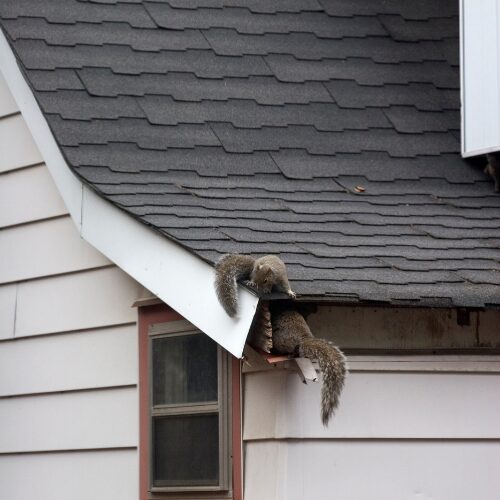That’s why we recommend regular roof inspections to identify and seal any potential entry points before squirrels can cause damage. Ensuring your roof is in top condition with secure flashing, intact soffits, and properly fitted gutters can make a big difference in keeping wildlife out. If you suspect squirrels have already made their way inside, addressing the issue quickly can prevent further damage. RainTech Roofing, Sheet Metal & Gutters is here to provide expert guidance on protecting your roof and keeping your home secure from these pesky intruders.
Signs of Squirrel Activity
Before you can address a squirrel problem, it is important to recognize the signs of their presence. While there are some problems that might be readily apparent, this, unfortunately, isn’t always the case. Here are some common indicators that squirrels may be on your roof or in your attic:
- Scratching or scurrying sounds coming from your ceiling or walls.
- Chewed electrical wire or insulation.
- Visible entry holes near eaves, vents, or soffits.
- Droppings and urine in attic spaces.
- Nesting materials, such a leaves and twigs, inside your roof.
If you notice any of these signs, it’s crucial to act quickly to prevent further damage. Squirrels reproduce rapidly, and a small problem can escalate into a full-blown infestation if left unchecked. Contacting a professional to inspect your roof and seal any entry points is the best way to protect your home from these persistent pests.

Why Are Squirrels Attracted to Roofs?
Like any other animal, squirrels are attracted to roofing systems because they provide adequate warmth and safety. As temperatures drop, your attic becomes an ideal refuge, offering shelter from harsh weather conditions. Since squirrels are agile climbers, they can easily find their way onto your roof and squeeze into small openings, leading to a full-blown infestation if not addressed. Once inside, they can cause extensive damage by chewing through materials, nesting in insulation, and even creating fire hazards by gnawing on electrical wiring.
Here are some common reasons squirrels might invade your roof and attic:
- Warmth and Shelter: Attics provide a dry, insulated space where squirrels can nest comfortably, particularly during the colder months when outdoor conditions are harsh.
- Easy Access: Squirrels use nearby trees, power lines, and even other buildings to jump onto roofs. Overhanging branches serve as a natural bridge, making it even easier for them to reach your home.
- Food Sources: If you have bird feeders, vegetable gardens, or unsecured trash bins, these can attract squirrels to your property. Once they establish a feeding ground nearby, your roof becomes a prime location for nesting.
- Safety from Predators: Ground-level threats such as cats, dogs, and larger wildlife drive squirrels to higher, more secure areas. Your roof offers an elevated vantage point, keeping them out of reach from common predators.
- Nesting Opportunities: Squirrels look for small gaps in roofs, vents, and soffits to create cozy dens. Damaged shingles, loose flashing, and unsealed entry points make it easy for them to burrow inside and establish a nest.
- Chewable Materials: Like all rodents, squirrels have teeth that continuously grow, requiring them to gnaw on materials to keep them filed down. They often chew on wooden beams, insulation, and even electrical wiring, leading to costly repairs and potential fire hazards.
Understanding these factors can help you take proactive measures to prevent a squirrel infestation. Regular roof inspections, trimming back tree branches, and securing potential food sources can all help minimize the risk of squirrels invading your home. If you suspect an issue, acting quickly can prevent extensive damage and keep your home safe from unwanted pests.
Risks and Damages Caused By Squirrels
While physical damage is among the most common risks and damages caused by squirrels, they are far from the only potential problem. For instance, squirrels might chew through roofing materials, fascia boards, and insulation, ultimately weakening the structure. Their tendency to gnaw on electrical wiring might also create a fire risk or lead to short circuiting.
In addition to these concerns, squirrels are known to carry parasites and diseases that may pose risks to your household. Since the attic system has direct contact with your indoor ceilings, droppings and urine can seep into the ceiling material over time and cause health concerns.
How To Prevent Squirrels
Preventing squirrel infestations starts with proactive measures. As you might imagine, there are many recommendations available on the internet from the countless pest control companies in Tulsa; however, we want to ensure you have a comprehensive and precise list available without needing to search for it. Here are some tips to help keep your home squirrel-free:
- Trim Overhanging Branches: Cut back tree limbs that provide easy access to your roof.
- Seal Entry Points: Inspect your roof for gaps, holes, and vulnerable areas, sealing them with durable materials.
- Install Gutter Guards: Gutter protection systems can deter squirrels from using gutters as pathways.
- Use Squirrel Repellents: Natural deterrents, such as peppermint oil or predator scents, can help discourage squirrels.
- Secure Food Sources: Keep garbage bins closed and remove any outdoor food sources that might attract squirrels.

What Do I Do If I Already Have Squirrels Inside my Attic?
Squirrels may be tiny, but the damage they cause on your roof is massive. Being proactive and taking professional help whenever necessary can save your house from these pests. Before working with a roofing contractor to fix damage and seal potential entry points, it is important to ensure that any present squirrels are removed.
If you suspect that squirrels have made their way into your attic, follow these steps:
- Identify Entry Points: Conduct a thorough inspection to find where squirrels are getting in.
- Encourage Exit: Use bright lights, loud noises, or commercial repellents to encourage squirrels to leave.
- Install One-Way Doors: These allow squirrels to exit but prevent re-entry.
- Seek Professional Help: If the problem persists, contact wildlife removal experts or a roofing professional for assistance.
Squirrel-Proof Your Roof with RainTech!
At RainTech Roofing, Sheet Metal & Gutters we understand the damage that pests like squirrels can cause to Tulsa homes, which is why we offer comprehensive solutions to protect your roof. Our expert team conducts thorough inspections to identify potential vulnerabilities and address them effectively. By sealing entry points with high-quality materials and reinforcing weak areas, we help homeowners prevent costly damage and ensure their roof remains secure.
In addition to structural reinforcements, we provide proactive measures such as installing gutter protection systems to deter pests and offering ongoing maintenance to keep your roof in top condition. Our goal is to deliver long-term solutions that safeguard your home from unwanted intrusions while maintaining the integrity of your roofing system.
Contact us today or give us a call at (918) 449-1474 for a FREE roof inspection and let our experts ensure your roof is in perfect condition. Whether you need a repair, a replacement, or simply peace of mind, we’re here to help.
